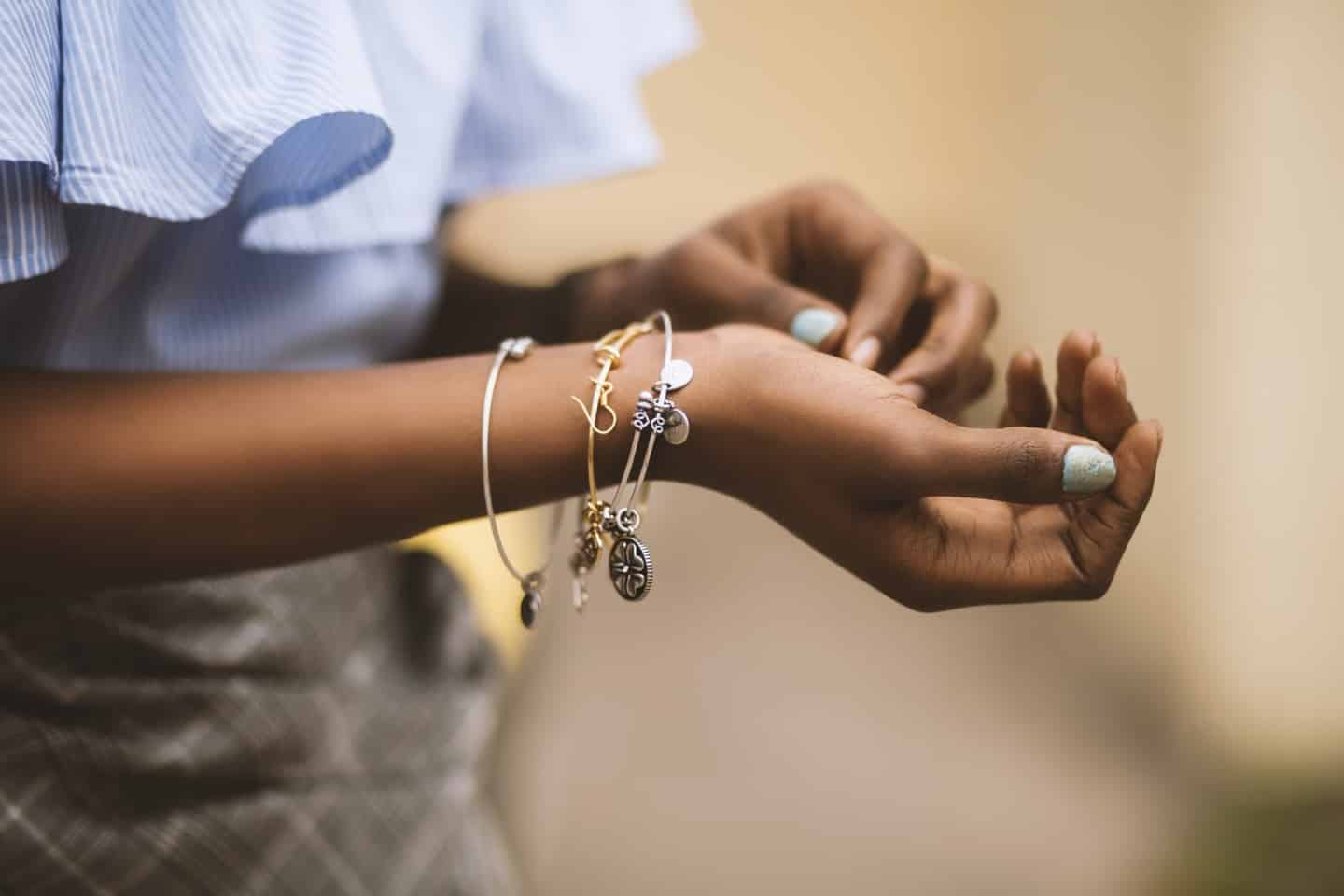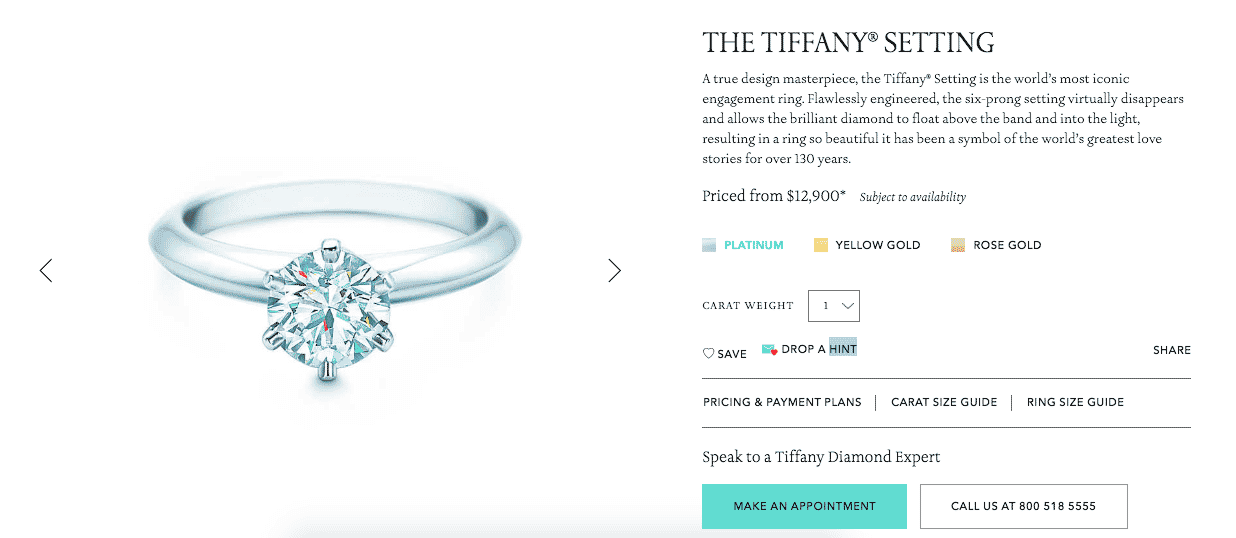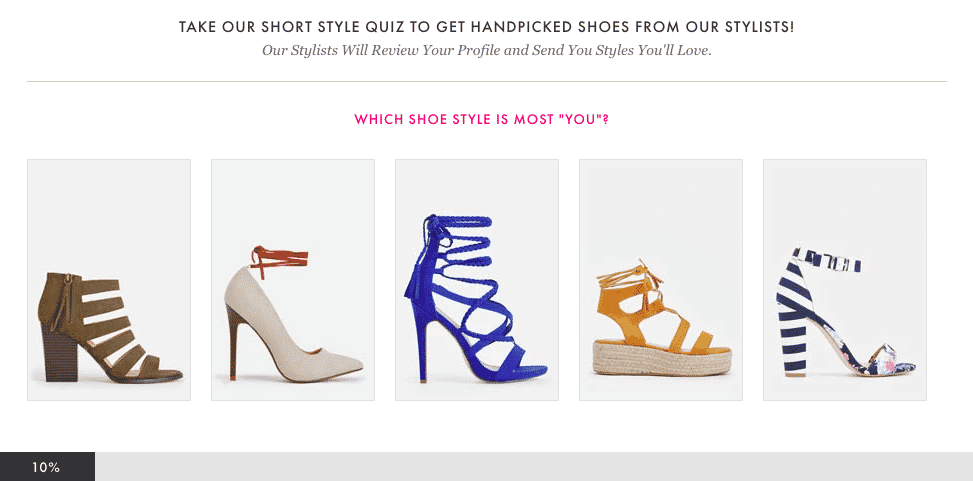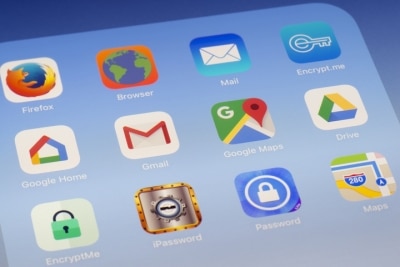Article
Shine Like A Tiffany Diamond: 6 Best Practices for Jewelry Brands
August 13, 2018

An Anglicized version of an old Latin word, “Lucida” refers to the brightest star in a constellation. For brides to be, Lucida might also refer to its namesake, the diamond cut patented by Tiffany & Co. It has 50 different facets, meaning it can look dozens of kinds of beautiful, depending on where the light hits the stone. And let’s be honest: It doesn’t look quite the same online.
Following that logic, many jewelry brands underinvest in digital… and it shows. Most jewelry purchases do happen in-store, but the customer journey is longer and more complicated than ever, with many digital touchpoints along the way. When it comes to delivering a modern, omnichannel shopping experience, jewelry brands perform poorly relative to other categories, according to our Retail Personalization Index evaluations.
What can they do better? It all begins with data. Just like a poker game requires an upfront payment to play, explicit and implicit data collection is your buy in to provide the most relevant, personalized shopping experiences, to engage in online purchasing, and to cement the relationship in-store.
Given jewelry brands’ unique challenges — attracting repeat customers, for one, given how many pieces are expensive, one-time purchases — we’ve taken it a step further. We’ve identified six strategies to help the Jareds, Blue Niles and Pandoras of the world really shine bright like a diamond.
1. Consider the Channel
It’s important to understand a customer’s regular purchase patterns, which sounds like a no brainer. But in the jewelry vertical, we recommend segmenting specifically based on where she buys as much as what she buys.
Does she typically buy in-store or online? If someone historically makes purchases at a physical retail location, use your digital channels to drive them back there. Jewelry can be difficult to contextualize online. If you see a picture of a necklace on a white background, you may not be able to tell how exactly how big it or how high it sits on someone’s neck. Consider inviting a regular shopper into the store to try on a new item you think they’d like through a clienteling strategy. For those who purchase online, offer live chat and user-generated content so that she can ask questions and see her potential purchase.
One jewelry brand already doing this is Tiffany & Co., which uses their digital channels to invite you to come into the store and experience the white glove service for which they’re known. Many product pages feature not only digital (add to cart) but physical (make appointment) calls to action. Another nice touch is the “Drop A Hint” feature, which emails product pages to consumers’ loved ones. You know, just in case they were thinking of buying a gift.

2. Long-Tail Nurture
Customer data helps you provide the best customer experience to turn a browser into a buyer. It also works afterward, during the post-purchase period. This ultimately increases sales and engenders loyalty, resulting in even more sales. And loyalty is key, especially as Amazon is now selling their own jewelry (because of course they are).
Let the data you have around a transaction fuel the way you nurture customers post-purchase. If you sell fashion jewelry, create content around how to wear it. You can go either way with this one, taking the opportunity to cross-sell with complementary items or simply adding value. “What does turquoise go with?” brings up more than 700 million hits on Google, so there’s certainly a demand for that guidance and by offering it up to your customers, you’ll create much-needed loyalty.
If your brand is centered on more expensive pieces, consider content that focuses on education and care (how do you clean glittering earrings?), celebrity endorsement, or cocktail party soundbites (the inspiration behind the specific piece purchased).
3. Segment Gift Givers
When someone buys shoes, they probably just needed (or OK, wanted) a new pair of shoes. For jewelry customers, those purchases are just as likely to be for someone else. Jewelry is a popular present. Each of the traditional anniversary gifts — paper on the first one, cotton on the second, you get the idea — has an accompanying gemstone. Jewelry was also the most-searched Mother’s Day gift in nine states, according to Google data. (Connecticut wasn’t one of them; in the Nutmeg State, it’s apparently customary to give your mom a garden animal statue.)
If the customer is a gifter, they may not want to hear from you as often as the person buying herself a necklace. Think of the occasion. Is it a birthday or anniversary present? That’s key information for remarketing when that milestone comes back around, which is also an opportune time to send a gift guide.
Gift guides are common for retailers and Alex and Ani takes that to the next level with different versions depending on the occasion, who the recipient is, and even her personality. The “art enthusiast” and “modern minimalist” aren’t likely to have overlapping tastes, which Alex and Ani takes into consideration. Additionally, the brand knows whether a customer is a gifter and retargets appropriately.

4. Predictively Price Drop
It goes without saying that income determines jewelry purchases. According to research from the International Diamond Exchange, the average household with a $25,000 annual income spends about $188 per year on jewelry. When a household earns more than $150,000, the average jewelry spend jumps up to $2,403. Given that chasm, jewelry purchases aren’t necessarily impulse buys, which means the typical retargeting tactics require some tweaking.
Most online shopping carts are filled and forgotten. Retailers send abandoned cart messages quickly, often with a discount as an extra push toward purchase. Diamonds inherently entail a longer customer journey than denim, so don’t mistake inactivity for indifference and start firing off special offers on the third day. Being too promo-happy can cost retailers, both in the near and distant future. There’s the incremental revenue loss from this purchase that someone may have made anyway and cheapening brand value overall.
We recommend jewelry brands use predicted average order value to determine their discount strategies. Think longer term and consider when — and how much — someone is predicted to purchase. Some larger purchases have financing options. As a customer nears the end of that period, drop a discount to incentivize their next purchase.
5. Personalize Like a Pro
From names in subject lines to responding on social media, there are countless ways to deploy the most basic personalization. We recommend taking it further and personalizing based on inbound terms. Given the frequency of gift-giving, there’s a lot of variation within the jewelry vertical. Few things give you a better sense of who your customer is than the search terms that brought them to your website in the first place.
Identify your highest-value search terms and use them to dynamically personalize your website content. If someone finds you by searching for engagement rings, make sure he or she sees them on the landing page. And if you score their email address, continue that and show more engagement ring-related content. Likewise, if someone finds you via gold bracelet searches, ensure you’re suppressing engagement rings from your recommendations. Good welcome streams take acquisition source in mind. Great ones factor the rest of your customer data, ensuring the most relevant communications possible.
Just Fab is one of the best personalizers around, starting with a style quiz used to learn shoppers’ tastes. That’s a good strategy for jewelry brands, too, since knowing a customer’s style is imperative in order to personalize product recommendations. Of course, that’s just the beginning of JustFab’s personalization. The brand delivers a different experience for every customer, based on a combination of factors, including browsing and email history.

6. Embrace Email
In a way, email ties the five previous recommendations together. Your customer profiles should dictate the aforementioned personalized welcome series you use to make a good first impression. From there, jewelry email marketing should be your go-to channel for cross-message coordinating, recommending the most relevant possible product and content recommendations.
Your cadence should reflect each consumer’s own buying habits and predicted likelihood to purchase. It’s not uncommon for retailers to email their lists on a daily (or even several-times-daily) basis. Fashion jewelers have more wiggle room there than the luxury players, whose messaging should be dialed back a bit.
Marketers frequently talk about Facebook’s massive global reach, but email’s is even bigger. As of last year, there were 3.7 billion email users, a number that represents nearly half the planet’s population. Time and time again, email has been proven to be the most consistent lucrative marketing channel. Many jewelry retailers’ websites don’t even include email acquisition, which shows that these brands don’t always recognize email’s inherent value. But they should.
Learn more here about marketing best practices and how you can use Marigold Engage by Sailthru’s marketing platform to create a quality customer experience.
The State of Brand Loyalty in the U.S. in 2023
Related



